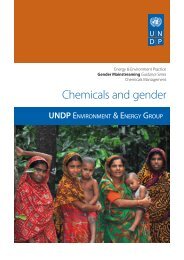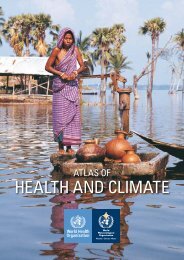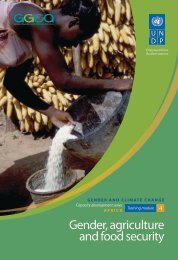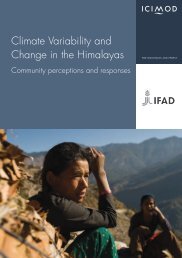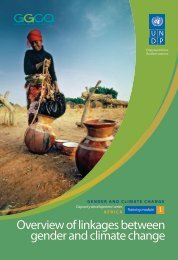jotoafrika - Gender Climate
jotoafrika - Gender Climate
jotoafrika - Gender Climate
You also want an ePaper? Increase the reach of your titles
YUMPU automatically turns print PDFs into web optimized ePapers that Google loves.
Women in Lindi, Tanzania, have to walk long<br />
distances to fetch water from caves<br />
© Yusuf Badi/British Council<br />
<strong>Climate</strong> change is impacting populations<br />
and ecosystems around the world, but<br />
people with the fewest resources are<br />
most susceptible – particularly women,<br />
the majority of the world’s poor.<br />
In most parts of Tanzania, women<br />
participate in crop and livestock production,<br />
and engage in off-farm activities to diversify<br />
the family income. They also provide food,<br />
water and fuel for their families and care for<br />
children, elderly people and the sick.<br />
Flora K. Munyasya, a student at the Institute<br />
of Rural Development Planning in Tanzania,<br />
conducted a survey in Bahi-sokoni village<br />
(Bahi District, Dodoma region). She looked<br />
at how households access their basic needs<br />
– fuel wood, water, food, education and<br />
health. The study showed that women and<br />
girls in the region contribute more than 70<br />
percent of a household’s time and efforts<br />
for domestic and farm activities (including<br />
land preparation, crop sowing, weeding and<br />
harvesting). The survey also found that:<br />
85 percent of all travel is done by<br />
women; 15 percent is by men and<br />
children.<br />
80 percent of all journeys are for<br />
transporting water and fire wood and<br />
travelling to the grinding mills.<br />
Joto Afrika is produced four times a year<br />
by ALIN in partnership with the Institute<br />
of Development Studies (IDS). The<br />
series is funded by the UK Department<br />
for International Development (DFID)<br />
through IDS Knowledge Services.<br />
Tackling climate<br />
change ward by ward<br />
Case study<br />
95 percent of this transportation is done<br />
by foot and head-loading.<br />
<strong>Climate</strong> change is affecting many of these<br />
activities. Previously, the area had reliable<br />
rains, and water and fuel wood were<br />
plentiful nearby. But recent severe droughts<br />
have caused many problems.<br />
The prolonged drought has led many<br />
people to abandon their traditional farming<br />
livelihood, of food crops and cattle breeding,<br />
to earn a living making charcoal and<br />
clay bricks. The felling of trees for these<br />
activities leaves women with even longer<br />
distances to walk in search of firewood,<br />
meaning yet more hours each day on the<br />
road, reducing their productive hours.<br />
Where there is family transport, for example<br />
a bicycle, men and boys dominate the use.<br />
Collecting water has also become more<br />
difficult. Some livestock keepers are<br />
reluctant to destock their animals and<br />
switch to alternative activities, since owning<br />
large herds is a sign of wealth. The lack<br />
of destocking causes overgrazing, which<br />
results in the destruction of possible water<br />
catchment areas. This, together with the<br />
long droughts, has caused a water shortage<br />
in the region. This has again left women<br />
with longer distances to collect water.<br />
Articles from Joto Afrika may be re-used,<br />
provided the materials are distributed<br />
free of charge and the author(s) are<br />
credited. Please send copies to ALIN.<br />
Views expressed in Joto Afrika do not<br />
necessarily reflect the views of the<br />
editors or ALIN, IDS and DFID.<br />
Guest Editor<br />
Grace Adeniji<br />
Department of Environmental<br />
Management, Lead City University,<br />
Ibadan, Nigeria<br />
Facing the effects<br />
Faced with these problems, the community<br />
decided to act. Members of Dodoma<br />
Environmental Networks (DONET) helped the<br />
community to form four Ward Environmental<br />
Networks. Each ward comprises two to five<br />
villages. To ensure effective coordination of<br />
the networks, the members formed the Bahi<br />
District Environmental Network.<br />
After identifying the predominant<br />
environmental problems in their ward,<br />
network members developed work plans<br />
to guide them in efforts to resolve these<br />
problems. Establishing and managing tree<br />
nurseries is the priority in each ward. The<br />
next step is tree planting around homesteads<br />
and establishing forests in reserved areas of<br />
each village. The network hopes that these<br />
efforts will gradually minimise the harmful<br />
effects of climate change in Bahi District.<br />
DONET is interested in exchanging<br />
experiences with other organisations and<br />
communities on counteracting the effects of<br />
climate change.<br />
Chitopela Amaundus<br />
Dodoma Environmental Networks, P.O. Box<br />
1414, Dodoma, Tanzania<br />
Tel +255 262324750<br />
donetdodoma@yahoo.com<br />
Chief Editor<br />
Esther Lung’ahi-ALIN<br />
Article adapted from the Dimitra newsletter<br />
Editorial Team<br />
James Nguo-ALIN<br />
Susan Mwangi-ALIN<br />
Anthony Mugo-ALIN<br />
Fatema Rajabali-IDS<br />
Freida M Cormack-IDS<br />
Consulting Editor<br />
Tim Woods<br />
Joto Afrika<br />
Arid Lands Information<br />
Network<br />
P.O. BOX 10098-00100<br />
G.P.O.<br />
Nairobi, Kenya<br />
Tel +254 20 2731557<br />
Fax +254 20 2737813<br />
SMS +254 717032322<br />
Email jotoafrica@alin.net<br />
ISSN 2075-5562



